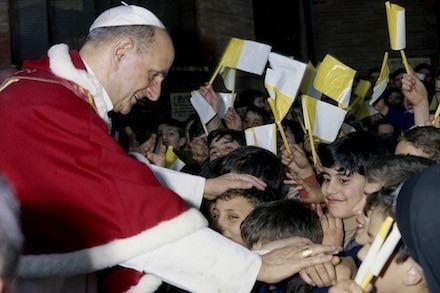Vatican II and the Laity
Part One
by CAPP-USA

Vatican II and after renewed the call of the laity to fulfill a special role.
In earlier articles, The Role of Laity Part 1, Part 2, Part 3, and Part 4, we explored the role of the laity as presented in the Church’s social teaching.
Here we will examine the laity’s role in light of Vatican II documents (Lumen Gentium, Apostolicam Actuositatem, Gaudium et Spes), and the specific teachings on the laity of Pope Saint Paul VI and Pope Saint John Paul II (Evangelii Nuntiandi, Christifideles Laici).
The Laity’s Special Role
The laity’s role is special! “In a word, ‘Christians must be to the world what the soul is to the body’.” (Lumen Gentium, 38)
“Christ’s redemptive work, while essentially concerned with the salvation of men, includes also the renewal of the whole temporal order. Hence the mission of the Church is not only to bring the message and grace of Christ to men but also to penetrate and perfect the temporal order with the spirit of the Gospel”. (Apostolicam Actuositatem, 5)
THE BODY
“What specifically characterizes the laity is their secular nature”. (Lumen Gentium, 31)
The Church “has an authentic secular dimension, inherent to her inner nature and mission…which is realized in different forms through her members”. (Pope St. Paul VI, 8)
“[T]he laity are called in a special way to make the Church present and operative…where only through them can it become the salt of the earth”. (Lumen Gentium, 33) — “there are certain things which pertain in a special way to the laity, both men and women”. (Lumen Gentium, 30)
Theirs is the “responsibility to serve society”. (Pope St. John Paul II, 39)
“[I]n particular the lay faithful are called to restore to creation all its original value. In ordering creation to the authentic well-being of humanity”. (Pope St. John Paul II, 14)
“Hence the active presence of the laity in the temporal realities takes on all its importance.” (Pope St. Paul VI, 73)
While “[t]he entire mission of the Church, then, is concentrated and manifested in evangelization”, (Pope St. John Paul II, 33) “the lay faithful…are fully part of this work of the Church: within ‘the confines of states, and systems political and economic, as well as the vast fields of culture, civilization, and development’.” (Pope St. John Paul II, 34)
THE SOUL
“Each individual layman must stand before the world as a witness to the resurrection and life of the Lord Jesus and a symbol of the living God.” (Lumen Gentium, 38)
“[T]hrough [the laity] the Church of Christ is made present in the various sectors of the world, as a sign and source of hope and of love.” (Pope St. John Paul II, 7)
“All the laity as a community and each one according to his ability must nourish the world with spiritual fruits.” (Lumen Gentium, 38)
“The Church’s mission of salvation in the world is realized…by all the lay faithful”. (Pope St. John Paul II, 23)
Where Does this Role Come From?
“The laity derive the right and duty to the apostolate from their union with Christ the head; incorporated into Christ’s Mystical Body through Baptism and strengthened by the power of the Holy Spirit through Confirmation, they are assigned to the apostolate by the Lord Himself.” (Apostolicam Actuositatem, 3)
What is the Laity’s Job?
It is quite a grand one! “[L]et the laity also by their combined efforts remedy the customs and conditions of the world’”. (Lumen Gentium, 36)
“The laity must take up the renewal of the temporal order as their own special obligation.” (Apostolicam Actuositatem, 7) “[T]hey are called to engage…as individuals in the varying circumstances of their life.” (Apostolicam Actuositatem, 18)
“[T]he laity, by their very vocation, seek the kingdom of God by engaging in temporal affairs and by ordering them according to the plan of God.” (Lumen Gentium, 31)
“The temporal order must be renewed in such a way that…it may be brought into conformity with the higher principles of the Christian life and adapted to the shifting circumstances of time, place, and peoples.” (Apostolicam Actuositatem, 7)
How do We Go About Fulfilling Our Role?
SECULARLY
“The vocation of the lay faithful to holiness implies…in a particular way in their involvement in temporal affairs and in their participation in earthly activities.” (Pope St. John Paul II, 17)
“[T]he lay faithful are never to relinquish their participation in ‘public life’, that is, in the many different economic, social, legislative, administrative and cultural areas, which are intended to promote organically and institutionally the common good.” (Pope St. John Paul II, 42)
“There is no better way to establish political life on a truly human basis than by fostering an inward sense of justice and kindliness, and of service to the common good, and by strengthening basic convictions as to the true nature of the political community and the aim, right exercise, and sphere of action of public authority.” (Gaudium et Spes, 73)
“The lay faithful’s duty to society primarily begins in marriage and in the family. This duty can only be fulfilled adequately with the conviction of the unique and irreplaceable value that the family has in the development of society and the Church herself.” (Pope St. John Paul II, 40)
“All citizens, therefore, should be mindful of the right and also the duty to use their free vote to further the common good.” (Gaudium et Spes, 75)
SPIRITUALLY
“[I]n every temporal affair they must be guided by a Christian conscience, since even in secular business there is no human activity which can be withdrawn from God’s dominion”. (Lumen Gentium, 36)
“[T]he lay person should learn especially how to perform the mission of Christ and the Church by basing his life on belief in the divine mystery of creation and redemption and by being sensitive to the movement of the Holy Spirit”. (Apostolicam Actuositatem, 29)





